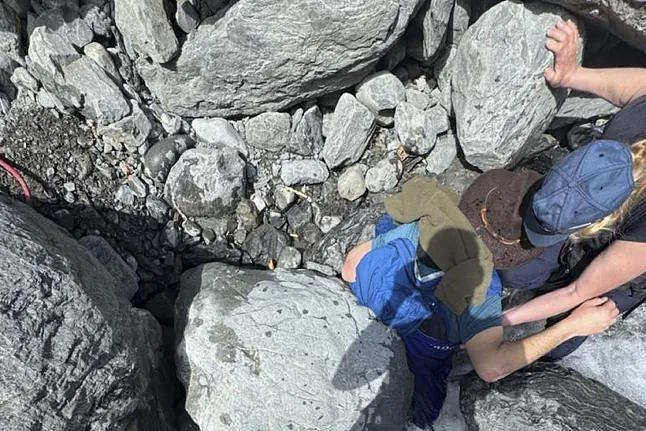A man from Alaska, Kell Morris, 61 years old, survived after being trapped face down in a frozen stream by a 318-kilogram rock (700 pounds) for three hours. The incident, which occurred this past Saturday near a glacier south of Anchorage, ended with Morris suffering minor injuries, thanks to the heroic action of his wife.
His wife, Jo Roop, a retired officer from the Alaska State Police, kept Morris's head above the icy water, preventing him from drowning while they waited for the rescue teams to arrive. The second stroke of luck came when a dog sledding tourism company operating on the glacier heard the emergency call and offered their helicopter to transport the rescuers to the remote location, inaccessible to off-road vehicles.
Morris and Roop had moved to Seward last autumn and decided to take a hike on a secluded and rarely traveled trail, a rocky streambed near the Godwin Glacier. Morris recounted that, while trying to navigate a dangerous rocky area, "the whole side just collapsed beneath my feet." He fell about six meters and felt the huge rock hit his back, with Seward Fire Chief Clinton Crites describing the incident as "essentially a rock avalanche." The way Morris fell, with other rocks supporting the weight, prevented him from being crushed, although he experienced intense pain in his left leg and feared his femur might be broken. "When it happened, I doubted it would end well," Morris confessed.
His wife tried to free him for about 30 minutes before seeking a cell signal. She managed to contact emergency services and, thanks to her police experience, sent precise GPS coordinates. A volunteer firefighter redirected the helicopter from the tourist operation, allowing the rescuers to arrive in time. By then, Morris was hypothermic. Crites emphasized that, without the helicopter, they would have taken "at least another 45 minutes to reach him, and I'm not sure he would have had that much time left." It took seven men and inflatable airbags to lift the rock and free Morris, who was extracted from the stream by an Alaska National Guard helicopter.
Morris spent two nights in the local hospital under observation, emerging unscathed. "I thought his body would recover, not that he would walk out without a scratch," Crites admitted.
Now, reflecting at home on his experience, Morris considers himself "probably the luckiest man in the world" and "fortunate to have such a wonderful wife." He acknowledged that this incident could be a "small wake-up call to stop doing things like this at his age." With a new perspective, Morris expressed, "I was very lucky. God was looking out for me." This weekend, he and his wife plan to stick to established trails: "We're going to stop being pioneers," he concluded.
